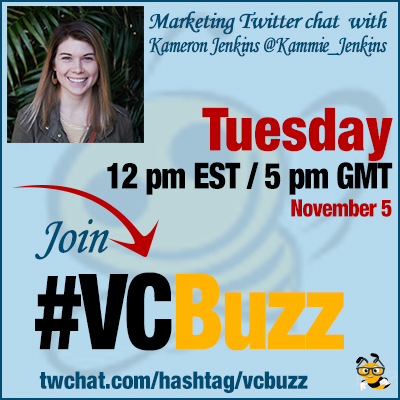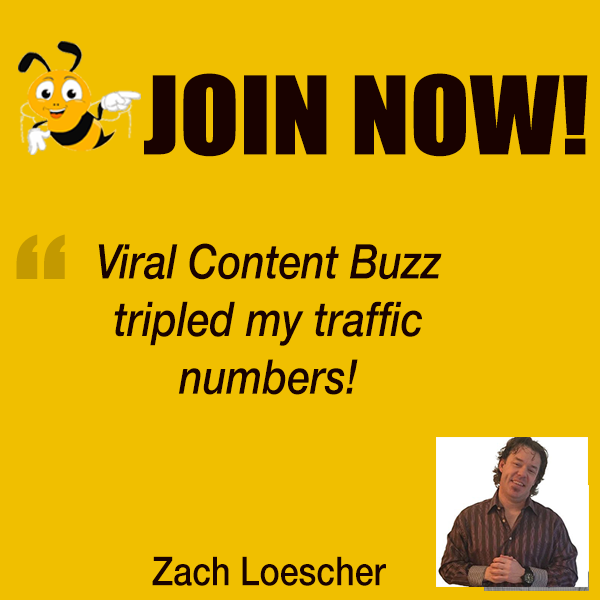
Google has said this for years: You need to create high-quality content in order to rank high in search results.
But what does it actually mean? What constitutes high-quality content?
Behind great content there’s usually a solid content strategy.
So how to set up a content strategy that would connect all the multiple digital marketing dots and bring organic brand visibility?
Let’s discuss!
***Add #VCBuzz chats to your calendar here.
***Please sign in here to follow the chat -> twchat.com/hashtag/vcbuzz
About Kameron
Kameron Jenkins @Kammie_Jenkins is director of content and communications at @Botify, the first enterprise SEO suite that supports each phase of the organic search process including technical SEO, content and real keywords.
When she’s not putting together content strategies, you can find her speaking about content and SEO or writing about it for publications like Moz and Search Engine Journal.
Questions we discussed
Q1 How did you become a digital marketer? Please share your career story!
I studied both marketing and journalism in college (couldn’t decide!) and ended up getting a job creating content for a digital agency’s SEO team, which seemed like the best of both worlds.
I ended up leading that agency’s SEO & content division until I left to join Moz’s content team. I was there a little over a year before I made the switch to my current position as Director of Brand Content at Botify 🙂
Q2 What is Content Comprehensiveness and why should marketers care?
See this for my full @Moz WBF on the topic but Google says high quality content “has a satisfying/comprehensive amount of content” & “provides a complete/comprehensive description of the topic”
“The Highest rating may be justified for pages with a satisfying or comprehensive amount of very high quality main content”
Q: “What counts as a high quality site?” A: You can answer “yes” to “Does this article provide a complete or comprehensive description of the topic?”
Q3 What should a comprehensive content strategy include?
To make a page comprehensive, ask “Have I answered all the main Qs someone would have about this topic?” Similar Q for a website’s content strategy “Am I covering all the main topics/Qs my audience has, relevant to my product/service?”
Generally the bigger the scope of the topic, the more content you'll need to make it comprehensive. When I notice my articles getting *really* long, that's usually a signal to me that I need to tighten up my topic and potentially break into separate pages #vcbuzz
— Kameron Jenkins (@Kammie_Jenkins) November 5, 2019
Google is intentionally not prescriptive! "Satisfying" is a subjective factor that differs depending on the unique topic being addressed. Answering is a combo of your best judgment and what else you see ranking for that topic. #vcbuzz
— Kameron Jenkins (@Kammie_Jenkins) November 5, 2019
Yep, those are very good questions! #vcbuzz
— Jessy Troy (@jessytroy) November 5, 2019
Q4 Where to start? How to set up a comprehensive content strategy?
“Content comprehensiveness” is a mantra that can help guide more than just your organic search content! Comprehensive content strategies will include content in the following buckets. Content that…
- Addresses a pain point your product/service can solve
- Is in high demand
- Creates demand through thought leadership
- Speaks to a newsworthy topic that your audiences care about
- Competitors have but you don’t
- Speaks to a question or objection being raised by your prospects or customers
- Tells your brand story as a means of improving brand sentiment
Q5 What are your favorite content marketing tools?
The classics! Google Search Console and Google Analytics. They show me how my audience is searching, what they’re finding once they get there, and how they’re interacting with it. Tons of insights in those two tools alone.
Aside from data, the best content tools you can have is your inquisitiveness (to seek answers when you don’t have them), creativity (to present content in interesting ways), and clarity (to help your audience easily find answers).
@Kammie_Jenkins A5. Yes! I do agree, use the tools that work for you. It's easy to be in love with all the tech bells and whistles. At the end of the day, it could be too much information. Keep things simple and relevant to your needs and clients #vcbuzz
— Janette Speyer (@JanetteSpeyer) November 5, 2019
A5) I’ve been really trying to pare down our tools to the essentials. Right now, it’s:
— Chad M. Crabtree (@ChadMCrabtree) November 5, 2019
–@ahrefs
-GSC
-GA
–@spyfu
–@VismeApp
#VCBuzz
A5 LOVE @textoptimizer as it forces you to expand your content by including related terms! #vcbuzz
— Ann Smarty (@seosmarty) November 5, 2019
Our previous content marketing chats:
- Biggest Technology Trends that Affect Content Marketing (And How to Adapt) with @DavidHartshorne #vcbuzz
- How to Build a Successful Content Marketing Team with @KayleighToyra #vcbuzz
- Content Marketing Idea Generation with Hans van Gent @jcvangent #VCBuzz
- How to Use Your Blog as a Content Hub with Cheval John @chevd80 #vcbuzz
- How to Analyze if Your Pages Are Keyword Relevant with Eric Enge @stonetemple #VCBuzz
- How to Find the Right Keywords for Your Business with @BradShorr #VCBuzz



